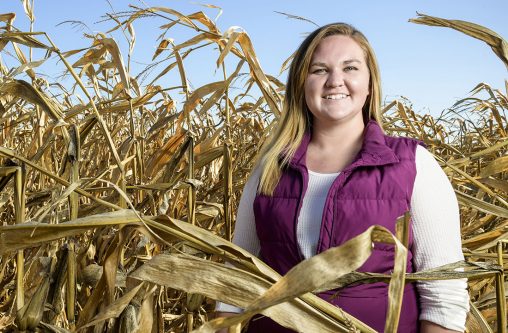
Wright State sophomore Olivia McDade one of many students in Lake Campus’ growing agriculture program. (Photo by Erin Pence)
Farming is in her blood. And once she graduates with a degree in agriculture from Wright State University’s Lake Campus, Olivia McDade wants to earn a master’s degree in agricultural economics at Purdue University.
But she will likely be back.
“I want to return to Ohio and work for an agriculture marketing group and possibly get involved with Wright State’s agriculture department,” she said.
In 2008, Lake Campus began offering agricultural elective courses that were part of existing degree programs. Five years later it began offering associate and bachelor’s degrees in technical and applied studies with an agriculture concentration.
Previously, local students interested in pursuing careers in agriculture had to go off to college in Columbus, Wilmington or Wooster or make long commutes there. With a program at Wright State, they could further their education while remaining active on their own farms.
Today, more than 65 students are enrolled in the agriculture program. Courses include topics such as animal science, animal health, nutrient management and agriculture finance.
McDade grew up on the family farm in rural Darke County, east of Greenville. She and her family farmed 20 acres and raised 120 head of sheep.
“Obviously, there is a lot of hard work that goes into working on the farm,” she said. “It definitely taught me a lot of responsibilities and work ethic.”
Growing up on a farm was a big factor in McDade pursuing agriculture. At Greenville High School, she was active in National FFA and 4-H.
After graduating in 2016, McDade enrolled at the Lake Campus. She wanted a university that offered a four-year degree, was affordable and was close enough so that she could continue to work full time on the farm.
“I really like it here,” said the sophomore. “The class sizes are small enough that I’m able to get that one-on-one time with professors.”
McDade also works part time for the Champaign, Clark, Darke and Miami County Farm Bureau in Troy, helping plan and coordinate events and working with local legislators on agricultural issues.
Last May, ground was broken at Lake Campus for the Agriculture and Water Quality Center, which is expected to be completed in February. The $3 million, 8,190-square-foot center was bankrolled with $1.5 million in state funds and the rest raised by Wright State.
The center will provide classroom space for the growing agriculture program; a hands-on research and laboratory area for applied learning and research on agricultural and water quality issues; an outreach facility for community meetings on agricultural production, water quality and other issues; and a focal point for partners to work proactively to support the regional agricultural industry as well as water quality efforts associated with nearby Grand Lake St. Marys and local watersheds.
The building will include two education classrooms that each seat 24 students and can be combined into one large educational/conference room. Agricultural education lab space designed for diverse hands-on agriculture education activities and research will have seating for up to 24 students. A lobby and conference area will be used as a student lounge and a space for events and conferences for up to 100 people.
“It’s going to offer a lot more hands-on learning, having the labs to work with,” said McDade.

 Wright State alum Lindsay Aitchison fulfills childhood space-agency dream
Wright State alum Lindsay Aitchison fulfills childhood space-agency dream  Wright State business professor, alumnus honored by regional technology organizations
Wright State business professor, alumnus honored by regional technology organizations  Wright State University Foundation awards 11 Students First Fund projects
Wright State University Foundation awards 11 Students First Fund projects  Gov. DeWine reappoints Board Treasurer Beth Ferris and names student Ella Vaught to Wright State Board of Trustees
Gov. DeWine reappoints Board Treasurer Beth Ferris and names student Ella Vaught to Wright State Board of Trustees  Joe Gruenberg’s 40-Year support for Wright State celebrated with Honorary Alumnus Award
Joe Gruenberg’s 40-Year support for Wright State celebrated with Honorary Alumnus Award 